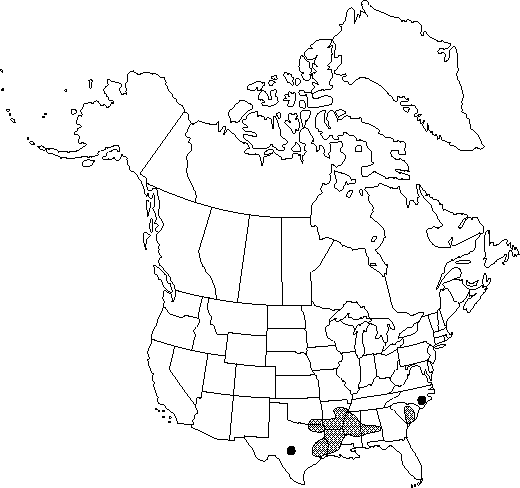Carya myristiciformis
Gen. N. Amer. Pl. 2: 222. 1818.
Trees, to 35 m. Bark gray to brownish, fissured or exfoliating, separating freely into long strips or broad plates. Twigs brown to bronze, slender, without hairs, densely scaly. Terminal buds bronze, ovoid, 4-6 mm, essentially without hairs, densely scaly; bud scales valvate; axillary buds protected by bracteoles fused into hood. Leaves 3-6 dm; petiole 3-10 cm, densely scaly. Leaflets (5-)7-9, lateral petiolules 0-2 mm, terminal petiolules 2-3 mm; blades ovate or obovate to elliptic, not falcate, 3-17 × 1-8 cm, margins finely to coarsely serrate, without tufts of hairs, apex acuminate; surfaces abaxially with unicellular and 2-4-rayed fasciculate hairs along midrib in spring, densely scaly with coating of large peltate scales and small irregular, round, and 4-lobed peltate scales, imparting bronze color, adaxially pubescent along midrib and major veins in spring, with scattered peltate scales. Staminate catkins pedunculate, to 6 cm, stalks and bracts scaly; anthers hirsute. Fruits light tan to bronze, obovoid to ellipsoid, not compressed, 2-3 × 1.5-2 cm; husks rough, 2 mm thick, dehiscing to base, sutures winged; nuts reddish brown mottled with tan patches, ellipsoid, not compressed, not angled, smooth; shells thick. Seeds sweet. 2n = 32.
Phenology: Flowering spring.
Habitat: River bottomlands, edges of streams, bluffs, and hillsides, often on calcareous prairie soils and marl ridges
Elevation: 0-500 m
Distribution

Ala., Ark., La., Miss., N.C., Okla., S.C., Tex., Mexico (Nuevo León).
Discussion
Carya myristiciformis is the rarest species in the genus. It is patchily distributed from the mountains of northeastern Mexico to the coastal plain of North Carolina.
Selected References
None.